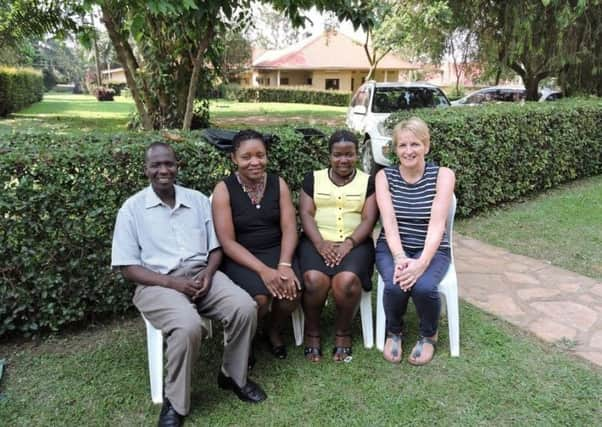Edinburgh hospice share expertise to tackle cancer in Uganda


Now the care and ethos that has brought comfort to many at St Columba’s Hospice is being used as a blueprint for the development of palliative care thousands of miles away.
Key staff from St Columba’s are due to travel to Uganda next month to help create a new breed of palliative care nurse leaders to help cope with the country’s soaring number of cancer cases.
Advertisement
Hide AdAdvertisement
Hide AdThey have already mentored nurses in Uganda via Skype, WhatsApp and e-mail sessions.
Janice Logan, a lecturer in palliative care at St Columba’s Hospice, and Dr Erna Harraldsdottir, the hospice’s director of education and research, will meet their mentees and join leading health figures at the African Palliative Care Conference.
It will be the second visit for Ms Logan. She visited Uganda in January to join the three nurses she has been mentoring as they carried out their palliative care duties.
She described the experience as “humbling”.
“For a lot of people in Uganda, cancer diagnosis is at a late stage due to inability to access health care because of the geographical area,” she said.
“Facilities available in hospitals are minimal. Sometimes the infrastructure is not so good. Nurses provide the more technical support and ‘hands-on’ care is often provided by families.
“I witnessed excellent examples of palliative care delivery when resources were at a minimum or not available. The values expressed by healthcare professionals, patients and families were humbling and have left me with much to consider for our work at St Columba’s Hospice.”
Cancer cases are on the rise in Uganda, with many cases detected too late and survival rates low. Less than 50 per cent of breast cancer patients survive and cervical cancer claims the lives of around 2500 women every year.
A shortage of doctors, the rural landscape and wide distribution of population means just ten per cent of patients can access the palliative care they need. The country’s 21-year-old radiotherapy machine also recently broke down, putting thousands of cancer patients’ treatment on hold.
Advertisement
Hide AdAdvertisement
Hide AdIn comparison, St Columba’s Hospice will mark its 40th anniversary next year. Its 30-bed facility in Boswall Road in Edinburgh recently underwent a £26 million refurbishment. It provides day care and inpatient services, ongoing support for families post-bereavement and it is regarded as a beacon of palliative care.
It is one of four UK hospices involved in the Uganda Palliative Care Nurse Leadership Programme which is run by a partnership which includes Edinburgh University. The hospices are based in England.
Ms Logan and Dr Harraldsdottir are mentoring two palliative care nurses from Hospice Africa Uganda in Kampala, and a senior nursing officer from the private community facility, Kalongo Hospital in the northern Agago district.
Jackie Husband, chief executive of St Columba’s Hospice, said: “Working on this project in Uganda has been an incredible experience for the team.
“The project is a really amazing way for the hospice to share the knowledge and experience we have gained through providing nearly 40 years of palliative care.
“Sharing knowledge is a key part of the work that we do, which is why we have a dedicated Centre for Education & Research. Our team are proud to work with countries from all over the world to help develop palliative care and raise standards.
“In addition, working with health and social care practitioners from across the world helps our staff to reflect on the services we provide here in Edinburgh.”